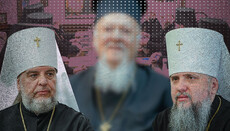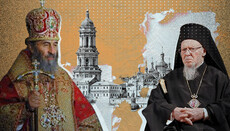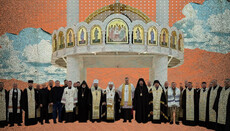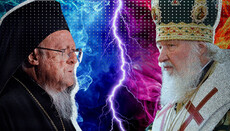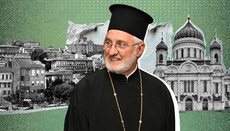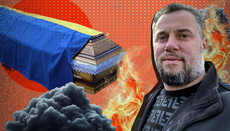Libel, propaganda and stigmatization: UOC under pressure in Ukraine
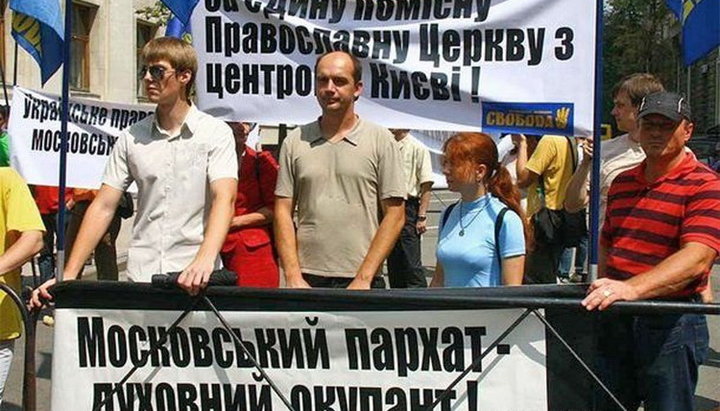
Human rights organization Public Advocacy has published a statement on the evidence of defamatory propaganda, by means of which pressure is being exerted on the Ukrainian Orthodox Church. The UOJ publishes a full text of the document.
To:
His Excellency Mr D. Tusk, President of the European Union
His Excellency Mr Thomas Greminger, OSCE Secretary General
Her Excellency Mrs D. Mijatovic, Council of Europe High Commissioner for Human Rights
His Excellency Mr Zeid Ra'ad Al Hussein, United Nations High
Commissioner for Human Rights
BODIES AND PROCEDURES OF THE INTERNATIONAL HUMAN RIGHTS MECHANISM:
UN Human Rights Council (including in a manner of a written statement within the procedure of the 38th session of the UN HRC)
Organization for Security and Cooperation in Europe
His Excellency Mr A. Shaheed, UN Special Rapporteur on Freedom of Religion or Belief
His Excellency Mr M. Forst, UN Special Rapporteur on the Protection of Human Rights Defenders
His Excellency Mr J. Figel, Special Envoy of the European Union for Freedom of Religion or Belief outside the EU
His All Holiness Patriarch Bartholomew I of Constantinople
Primates and Synods of Local Orthodox Churches of:
Poland, Romania, Bulgaria, Alexandria and all Africa, Greater Antioch and the whole East, the Jerusalem Patriarchate, Georgia, Serbia, Cyprus, Athens and all Hellas, Albania, the Czech Lands and Slovakia
STATEMENT BY NGO PUBLIC ADVOCACY
REGARDING EVIDENCE OF DEFAMATORY AND STIGMATIZING PROPAGANDA AS AN ELEMENT OF
UNLAWFUL PRESSURE ON THE UKRAINIAN ORTHODOX CHURCH
Since 2015, NGO "Public Advocacy", which has the consultative status with the UN Economic and Social Council, in cooperation with the OSCE SMM and the UN OHCHR SMM, has been monitoring the observance of rights in the religious sphere of Ukraine.
We draw the attention of the OSCE, UNHCHR, the UN Human Rights Council, the Council of Europe, bodies and structures whose mandate includes the protection of human rights, as well as all stakeholders to the fact that in April-May 2018 illegal pressure on the Ukrainian Orthodox Church has grown. First of all, it is caused by the attempts to impose the project of the Single Local Church (hereinafter SLC) and autocephaly on Orthodox believers of Ukraine in a format being rejected by the significant number of Orthodox believers.
The statements of the President of Ukraine and the decisions of the Parliament, numerous visits of diplomatic delegations of Ukraine to Istanbul, meetings of state officials with the Patriarch of Constantinople allow us to conclude that this issue is no longer an internal matter of the Church. The hierarchy and believers of the Ukrainian Orthodox Church are subjected to the intensified political and administrative pressure aimed at forcing them to accept the SLC project in the format which is considered proper by the presidential political circles.
In particular, the President of Ukraine stressed that he is determined to act very decisively towards the creation of the SLC and to oppose all who will stand in the way of "national interests of Ukraine", the website of the President reports. "This is a matter of national security and our defense in a hybrid war, because the Kremlin views the ROC as one of the key instruments of influence on Ukraine," Petro Poroshenko said. "Therefore, I am very determined to act in this matter. And to counteract all those who will stand in the way of Ukraine's national interests and will try to disrupt cooperation with the Ecumenical Patriarchal Throne," he said.
This situation is an unacceptable interference of government officials in the internal affairs of the Church, which is not only separated from the state, but also has the right to maintain its status, including legal and canonical.
In accordance with international legal standards and European practice, the form and method of canonical relations of any Church with religious foreign centers are an internal matter of a religious denomination and constitute the religious identity of believers. Confession of religious beliefs in a particular Church is a subjective right to freedom of religion, and everyone has the right to choose the Church according to their selection criteria, including canonical one.
Citizens of Ukraine, as well as church hierarchs, are not prohibited from contacting leaders of other religious faiths and expressing to Constantinople Patriarch Bartholomew, as well as others, their views on matters relating to religious life, especially in the situation when the public administration interferes into affairs of the Church, which has the autonomous legal status of an association (corporation) of private, rather than state-public law. The collection of signatures, petitions, appeals, statements alongside organizing meetings, rallies, demonstrations and negotiations appear as forms of expression of the opinion of civil society and guarantees of democratic European freedoms.
Unfortunately, we have to state that the listed rights are currently being restricted by government officials who exert unlawful pressure on believers, forcing them to abandon legitimate forms of expressing their opinions on issues they are concerned with. In a number of cases, there have been documented threats and facts of conducting "preventive" interviews by law enforcement officials in order to block the initiatives of believers in expressing their viewpoint on the establishment of the Single Local Church.
One of the lines of illegal pressure is a requirement on the part of a number of state employees and politicians to change the name of the Ukrainian Orthodox Church by affixing the Moscow Patriarchate to the name and changing the organizational status of the UOC for Exarchate of the Moscow Patriarchate. Such requirements are illegal and unacceptable in a civilized society. Changing the name of the UOC by indicating its affiliation to the Moscow Patriarchate, as well as changing the organizational form for the Exarchate cannot be achieved either by administrative or compulsory legal decisions, since these issues pertain to the sphere of civil law and can only be resolved by the decision of the Ukrainian Orthodox Church. Any administrative resolution in this matter will not only be against democracy and law, but will testify to the total loss by Ukraine of its minimal standards of civilized state administration.
Another unacceptable legal violation is resorting to hate speech that incites religious hatred – in the rhetoric of leaders of religious confessions and civil servants – in relation to the Ukrainian Orthodox Church.
As a matter of fact, leader of the religious confession of the UOC-Kyiv Patriarchate Filaret Denisenko alongside a number of hierarchs of this faith, without any grounds or evidence, publicly accuse the Ukrainian Orthodox Church of propagating the "Russian world", voicing statements that that the status of the UOC can be changed to "exarchate". In a number of cases, the clerics of this denomination initiate power clashes around the UOC temples and openly demonstrate a negative and hostile attitude towards Orthodox believers. Numerous proofs of such actions are contained both in the information space and reports of human rights organizations. All these facts testify not only to the inter-faith tension in the country, but also to the use of the state administrative resource, which publicly and openly supports aggression against the Ukrainian Orthodox Church.
A marker of the aggressively hostile propaganda towards Orthodox believers of the UOC is that personal data of the hierarchs of the Ukrainian Orthodox Church – Chancellor of the UOC Metropolitan Anthony (Pakanich), head of the UOC Representation to European Organizations Bishop Victor (Kotsaba), deputy chairman of the Department for External Church Relations of the UOC Prot. Nikolai Danilevich, and priest Aleksei Zoshchuk – were published on Mirotvorets (Peacemaker) site.
As you know, the activity of this site is provocative, as it publishes personal data, the placement of which without the consent of the owner is a criminal offense in accordance with Article 182 of the Criminal Code of Ukraine. Besides, given the nature of the activity of this information resource, publishing personal data of church hierarchs testifies to incitement of religious enmity towards Orthodox believers.
It should be noted that the activities of Metropolitan Anthony (Pakanich) of Borispol and Brovary, Bishop Victor (Kotsaba) of Baryshevka, Protopriest Nikolai Danilevich, as well as priest Aleksei Zoshchuk, are qualified as the work of human rights defenders. According to the standards of the OSCE, the European Union, and the norms of international law – those who defend rights, including religious ones, are recognized as human rights defenders regardless of their professional status.
States, including Ukraine, have assumed increased obligations to protect the rights of human rights defenders and pledged to provide conditions for their free and unhindered work. Pressure due to professional activities, as well as threats, including if they come from civil servants and are sanctioned by senior officials, bear testimony to the totalitarian nature of state power, which directly affects the attitude of the international community towards the state.
In particular, the UN Special Rapporteur on the situation of human rights defenders has repeatedly expressed concern that in some state regimes, human rights defenders are often labeled as enemies of the state or terrorists in an attempt to delegitimize their work and activities. Common attempts of this kind include labeling human rights defenders as extremists, traitors and spies, discrediting their work as activities aimed at overthrowing the government ... (see Report of the Special Rapporteur on the situation of human rights defenders A / HRC / 25/55, December 23, 2013, Para 86).
PACE has also expressed its concern that "in a number of countries, defamatory campaigns are launched against human rights defenders to discredit them; they are accused of lack of patriotism, they are called traitors, "spies" and extremists." PACE urged the member states to stop unfounded accusations of human rights activists as "extremists or agents of foreign states" (PACE Resolution 1891 (2012), Para 5.8.).
In a number of countries, the harassment and defamatory campaigns fit into the broader tendency to delegitimize human rights activists who allegedly receive money or perform their work in a professional capacity as individuals, motivated primarily by financial gain, rather than human rights considerations. There are reports that targeted defamatory campaigns, including in the media, are carried out against certain human rights defenders or their organizations and that they are subjected to other forms of stigmatization being detrimental to their personal reputation or credibility of their organization (see OSCE guidelines for the protection of human rights defenders, Para 121).
A case in point is information messages about priest of the UOC Aleksei Zoshchuk, posted by the Ukrainian information resource Obozrevatel (Observer) under the title "For the money of Russia? Scandalous priest of the UOC MP boasts of a luxurious holiday in UAE" and interpreted as a stigmatizing campaign. This publication contains personal photos of the family of Aleksei Zoshchuk, including minor children, showing that in February 2018 he spent an expensive vacation with his family. Additionally, he is alleged "to go to Moscow with his assistant for a meeting with the FSB curator to receive instructions and discuss the strategy of the information and propaganda war against Ukraine and disrupting the establishment of a Single Local Ukrainian Orthodox Church."
Such accusations are an example of the planned slanderous information propaganda against the clergyman who, by the nature of his activities, defends the rights of believers. Earlier, Aleksei Zoshchuk became the victim of an attack by the radicals from S14, who’d broken into the office of the information agency Union of Orthodox Journalists, with which A. Zoshchuk carries out his professional activities.
Having studied this case, we as a human rights organization rendered legal support to the Union of Orthodox Journalists and also forwarded the information on violations of journalists' rights to the UN Human Rights Council, the UN Special Rapporteur on Freedom of Religion or Belief, to other bodies of the international human rights mechanism. The OSCE Special Monitoring Mission also got interested in this case, while the Office of the United Nations High Commissioner for Human Rights mentioned in its annual report that there was indeed an attack on the UOJ office, which coincided with the beginning of the information campaign against the Ukrainian Orthodox Church. Therefore, this matter is controlled by the system of the international human rights mechanism.
As we were able to establish, in January-February 2018, threats came in to the family of Aleksei Zoshchuk, which were assessed as real, and he was offered financial assistance from a private person, as a result of which the priest went to the place he himself had not chosen for his "rest". However, if one studies the publication on the Obozrevatel site, where there is a video of some people (according to the site it was Aleksei Zoshchuk) getting on the train – it is obvious that the priest was a target of silent surveillance – and unknown persons were keeping watch over him intentionally in order to collect material for a libelous article and launch a defamatory information campaign.
Thus the case of Aleksei Zoshchuk is an example of stigmatization of the priest for his human rights activities to protect his flock. In fact, the slanderous articles included all labels available at the moment which the Ukrainian society is most sensitive to: a luxury holiday (while ignoring the fact that during this period the priest was actually forced to hide from a real threat to his life and not mentioning a word about the attack on the UOJ by the radicals), as well as unverified and unfounded accusations of his links with the FSB.
It’s noteworthy that in fact the Obozrevatel site and other resources that made similar publications committed an offense, as the photos posted on them were contained in a smart phone of A. Zoshchuk, which had been hacked, with personal photos stolen to subsequently become the subject of slanderous propaganda. Thus, the media disseminated personal data without the consent of the owner, which is subject to criminal liability.
To date an application has already been filed for commencement of criminal proceedings, and a civil suit is currently being prepared against the mass media which are guilty of inciting a defamatory campaign against the clergyman.
We draw attention to the fact that the right to privacy, as provided for in article 17 of the International Covenant on Civil and Political Rights, includes protection against unlawful infringement of reputation and honor. Consequently, the states parties to the Covenant are obliged to protect human rights defenders from such encroachments, regardless of (as indicated by the UN Human Rights Committee) whether these actions originate from state bodies or from individuals or legal entities. (See General Comment No. 16 of the UN Committee on Human Rights, Article 17 "The Right to Privacy," April 8, 1988)
Of particular attention is the fact that both Metropolitan Anthony (Pakanich) and Bishop Victor (Kotsaba), as well as Prot. Nikolai Danilevich, were stigmatized for their human rights activities related to their public speeches at international venues of the OSCE and the UN. This fact certainly will not go unnoticed by the international community and the state of Ukraine will have to make efforts to eliminate this offense as quickly as possible; otherwise it will serve as an evident proof of the anti-European and anti-legal policies of the ruling politicians in Ukraine.
Information materials on the above topic are published at the following link.
In the light of the foregoing, I request your greatest attention to the above facts and to take actions to protect the rights of Orthodox believers in Ukraine, prevent interreligious clashes and help put an end to political, administrative and power pressure on the religious faith of the Ukrainian Orthodox Church.
Oleg Denisov
President of NGO Public Advocacy
